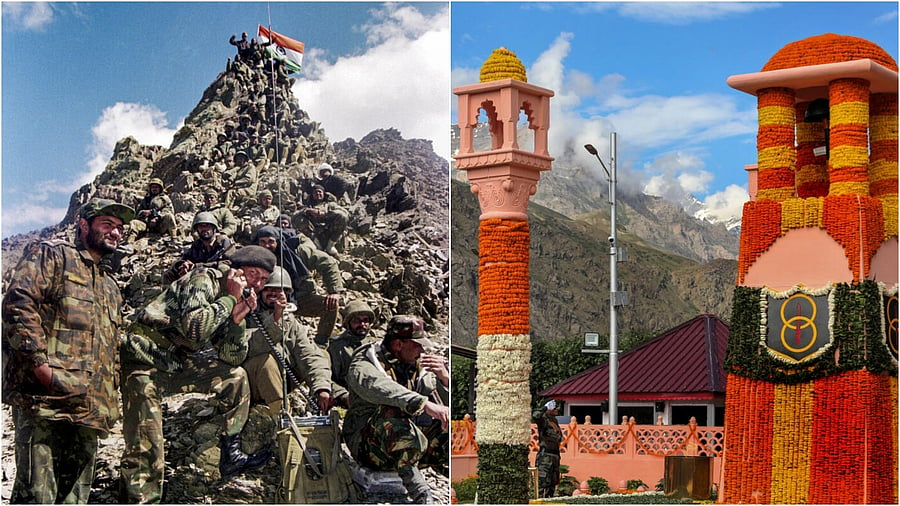
In this photo from PTI archives, Indian army soldiers are seen at Tiger Hill in the Drass-Kargil area of Ladakh(L), Kargil War Memorial in Dras.
Credit: PTI Photos
The Pahalgam terrorist attack that killed 26 people, mostly tourists in Kashmir has yet again brought to the fore the constant tension simmering between India and Pakistan.
In the aftermath of the deadly terrorist attack, India took a series of drastic measures, both diplomatic and otherwise in retaliation-closing the land border, cancelling visas and suspending the Indus water Treaty.
Amid rising tensions between India and Pakistan, the month of May also marks the beginning of the Kargil war in 1999 that was one of the deadliest battles fought between the two nuclear armed nations.
The Kashmir conflict
The division of India and Pakistan into Hindu and Muslim majority nations respectively, began a series of mass migration and communal violence in 1947. With the divide-and-rule policy implemented by the British, territorial conflicts over Kashmir also rose.
When armed terrorists backed by Pakistan aimed to take over Kashmir, the Muslim majority state which was headed by a Hindu king, agreed to cede to India in exchange for military protection, sparking off a dispute that would see at least two major wars and constant conflicts over the decades.
Kargil War- How it began
While both India and Pakistan had tested nuclear weapons a year earlier, the hostile neighbours in 1999 signed the Lahore Agreement to prevent a war. But despite that, Indian Army soldiers were tipped off in first week of May by some local shepherds of suspicious activity in the Indian side which also included the Kargil region. The armed men included both terrorists and Pakistani soldiers. Under Operation Badr, the infiltrators wanted to force their way and capture Kargil as part of a larger plan to claim Kashmir.
How India retaliated
The Indian Army hit back at the Pakistani side by launching operation 'Vijay' and reclaimed the infiltrated regions. The Indian Air Force also aided the Army alongside and their operation was named Operation 'Safed Sagar'.
The war lasted almost for three months and diplomatic negotiations that included international community also pressurising Pakistan to recede. Eventually, the then Pakistan PM Nawaz Sharif announced their side would retreat. The Battle of Tiger Hill was one of the fiercest battles in the war and India managed to recapture the point.
Pakistan on Saturday announced that it has conducted a successful training launch of the Abdali Weapon System — a surface-to-surface missile with a range of 450 km, amid heightened tensions with India following the Pahalgam terror attack.
“The launch was aimed at ensuring the operational readiness of troops and validating key technical parameters, including the missile’s advanced navigation system and enhanced manoeuvrability features,” the army said in a statement.
The army said the missile launch was part of “Exercise INDUS” without giving details about the exercise.
(With PTI inputs)
